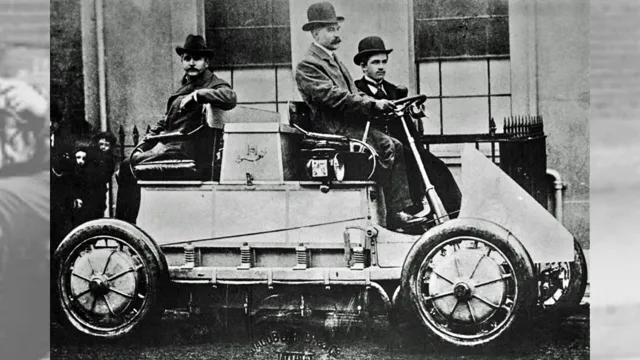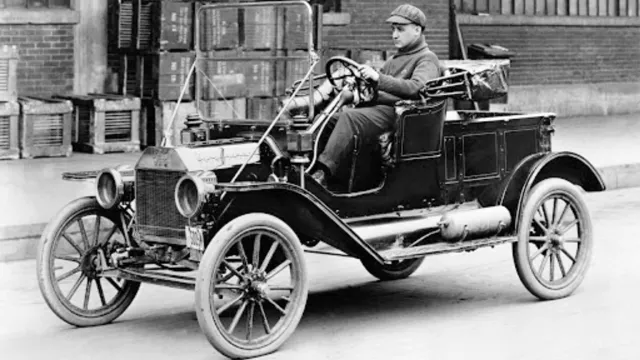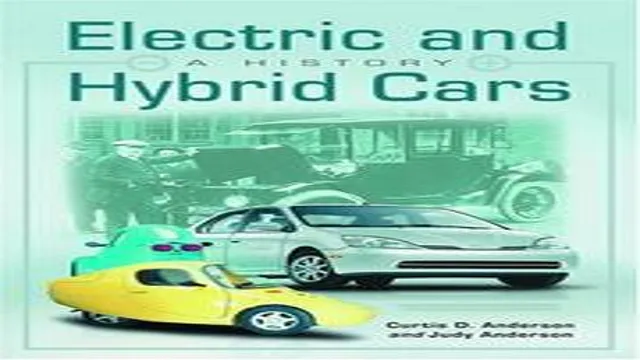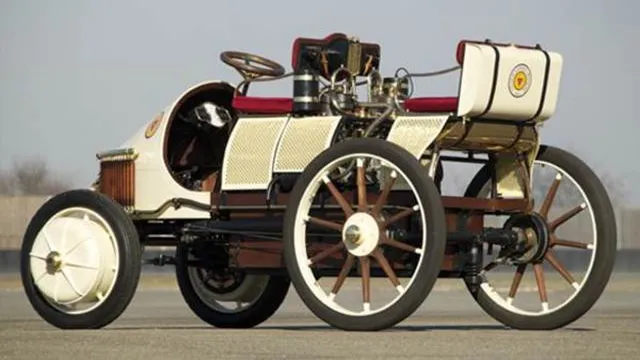The Shocking Saga of Electric Cars: Exploring Their Fascinating History and Controversial Debate
Electric cars, despite being some of the most revolutionary vehicles of our time, have been shrouded in controversy since their inception. The history of electric cars spans back to the 19th century, with early prototypes being developed as far back as the 1830s. However, the technology wasn’t quite ready for widespread use, and it wasn’t until the 1990s that electric cars began to make a comeback.
Even then, they faced opposition from the auto industry and oil companies alike. Today, electric cars are becoming more and more popular, but there are still concerns about their range, cost, and overall practicality. Some people argue that electric cars are just a fad, while others believe they are the key to a cleaner, more sustainable future.
In this blog, we’ll take a closer look at the history of electric cars, from their early beginnings to the present day. We’ll explore the controversies surrounding them and examine the arguments for and against them. Whether you’re a die-hard electric car enthusiast or just curious about this exciting new technology, you’re sure to find something of interest in our exploration of the past, present, and future of electric cars.
So buckle up and join us on this electrifying ride!
Early Beginnings
The history of electric cars dates back to the late 1800s when inventors began experimenting with battery-powered vehicles. However, it wasn’t until the early 1900s that electric cars gained popularity, especially in urban areas as they were quieter and produced no harmful emissions. Despite their early success, electric cars faced controversy as gas-powered cars eventually became more affordable and easier to produce.
The development of the interstate highway system also played a role in the decline of electric cars, as gas-powered cars had a greater range and could travel longer distances. The controversy surrounding electric cars continued for decades, with some enthusiasts advocating for their use while others criticized their limited range and high cost. Today, however, electric cars have made a comeback as concerns over the environment and the cost of gasoline have brought renewed attention to these vehicles.
With the technology advancing, electric cars have become more affordable, have longer ranges, and are now a viable option for many drivers.
Invention of the Electric Car
The invention of the electric car is a technological achievement that has radically changed the way we think about transportation. Early beginnings of electric vehicles (EVs) can be traced back to the 19th century, where they were first invented as a cheaper alternative to gasoline-powered cars. As time progressed, there were many inventors who wanted to create a more efficient and sustainable mode of transportation, and this led to the development of the first practical electric car.
One such inventor was Thomas Davenport, who patented the first electric motor in 183 By the late 1800s, EVs were the preferred mode of transportation in cities due to their quiet and clean operation. However, the rise of gasoline-powered cars in the early 1900s overshadowed the EV market, leading to a decline in the industry for several decades.
Nevertheless, with the current shift towards sustainability and the growing concern over carbon emissions, the electric car is once again in the spotlight as an alternative to gas-powered vehicles. The early beginnings of the electric car industry have paved the way for the modern EV revolution, and we can only anticipate more innovative and advanced technologies to come.

First Popular Electric Cars
One of the earliest popular electric cars dates back to the late 19th century, when electrical engineer Thomas Parker developed a series of electric vehicles in 188 Parker’s designs were predominantly used for transporting cargo, but by the end of the 19th century, electric cars were being manufactured and marketed to consumers. In 1899, La Jamais Contente became the first electric car to reach speeds over 100 km/h (62 mph).
The vehicle was driven by Belgian Camille Jenatzy and reached a top speed of 1088 km/h (679 mph).
This achievement helped to popularize electric cars and paved the way for further developments in the industry. Despite this, the adoption of electric cars was slow due to high costs and a lack of infrastructure. Today, with advancements in technology and a need for eco-friendlier modes of transportation, electric cars are becoming more accessible and common in everyday life.
Challenges & Controversies
The history of electric cars is both fascinating and controversial. While many consider electric vehicles as a new invention, the first electric car was actually created in the 1800s, long before hybrids or gasoline-powered vehicles were even thought of. However, electric cars failed to gain significant traction due to limitations in battery technology, resulting in a shift towards internal combustion engines that relied on gasoline.
This led to a decline in the development of electric cars, and it wasn’t until the early 2000s that electric vehicles started to gain attention once again. However, challenges such as high battery costs and insufficient charging infrastructure have hindered the widespread adoption of electric vehicles. Additionally, the debate around the environmental impact of electric cars, particularly their reliance on rare earth metals, has sparked controversy within the automotive industry.
Despite these challenges, many companies are still investing in electric car technology, with hopes of creating a more sustainable and environmentally friendly mode of transportation for future generations to come.
Lack of Range and Infrastructure
One of the biggest challenges facing the adoption of electric vehicles is the lack of range and infrastructure. While electric vehicles have come a long way in terms of battery technology, many models still don’t have the range necessary for long road trips, and charging infrastructure remains limited in certain areas. This is a major concern for drivers who need to travel long distances or live in areas with limited charging stations.
However, the good news is that efforts are being made to address this issue. Governments and private companies are investing in more charging infrastructure, and new technologies are being developed to increase battery range. As EV technology continues to improve, we can expect to see more widespread adoption of electric vehicles in the coming years.
Safety Concerns
Safety concerns are always an important topic when it comes to almost any industry. In the technology sector, there have been many challenges and controversies surrounding safety. One of the main concerns is the use of artificial intelligence (AI) and its impact on safety.
With AI handling tasks that were previously done by humans, there is always the possibility of malfunctions and accidents that could potentially harm people. Another aspect is the security of data being handled by technology companies. There have been multiple cases where cyber-attacks have led to the breach of sensitive information.
These examples highlight the importance of safety and security measures when it comes to technology. To ensure the safety of people and their data, companies need to invest in secure systems and procedures while also encouraging a culture of safety first. Only then can we minimize the risks and challenges that come with technology advancement.
Environmental Impact of Batteries
Batteries have become an essential part of our daily lives, powering everything from our smartphones to our electric vehicles. However, the environmental impact of batteries has become a hotly debated topic, with some environmentalists warning about the potential long-term negative effects of battery production and disposal. One of the main challenges associated with batteries is the raw materials used in their production, which are often mined from ecologically vulnerable areas.
For instance, cobalt is a key component in lithium-ion batteries for electric cars and is mainly sourced from the Democratic Republic of Congo, where the mining process has been linked to child labor and habitat destruction. Another controversy associated with batteries is their disposal. When batteries are no longer functional, they are often discarded in landfills, where they can pollute the land and waterways with toxic chemicals.
Because of these challenges and controversies, it is important to find ways to make batteries more sustainable by sourcing materials responsibly and improving the recycling process.
Recent Developments
Electric cars have come a long way since their inception in the early 1800s. After years of rapid advancements, electric cars finally became mainstream in the 21st century. However, electric car history and controversy go hand in hand, with debates on their environmental impact, affordability, and efficiency raging on.
Nevertheless, there have been significant developments in the electric car industry in recent years. One of the most significant developments is Tesla’s success in revolutionizing electric cars with their range, charging capabilities, and performance. Other car manufacturers have followed suit with the release of affordable electric cars such as the Nissan Leaf and the Chevrolet Bolt.
Governments around the world have also offered subsidies and tax incentives to encourage people to buy electric vehicles. The electric car industry is poised for continued growth, with advancements in battery technology and charging infrastructure set to reduce range anxiety and make electric cars more practical. Despite the challenges of electrification, it is undeniable that electric cars have a promising future.
Tesla’s Impact on the Industry
Tesla has had a significant impact on the automotive industry, particularly in recent years with their groundbreaking developments. The company has revolutionized the electric vehicle market and prompted traditional automakers to hastily invest in electric technology. Tesla’s success in creating an electric vehicle with a long-range has greatly influenced the automotive industry, leading competitors to develop their versions of long-range electric vehicles.
The company’s innovative Autopilot feature also inspired other automakers to develop advanced driver-assistance systems, enhancing the safety features of their vehicles. Tesla’s impact on the industry is undeniable, and it will continue to shape the future of automotive technology for years to come.
Government Support for Electric Cars
Electric Cars, Government Support, Recent Developments The recent surge in popularity of electric cars has led to an increase in government support around the world. Countries like the UK, France, Germany, and China have implemented policies to incentivize consumers to switch to electric vehicles. In the UK, for instance, the government offers grants to cover up to 35% of the cost of a new electric car, up to a maximum of £2,500.
This has helped to fuel the uptake of electric cars, with sales increasing by 225% in 2020. Similarly, in France, electric car buyers can receive a grant of up to €7,000, while German buyers can receive up to €9,000 off the cost of a new electric vehicle. In China, the government has set a target for 25% of all vehicle sales to be electric by 2025, and it has implemented a range of policies to support the transition, including tax breaks and subsidies for electric car purchases.
As public concern over climate change grows, governments are recognizing the need to promote low-emissions vehicles, and this trend towards government support for electric cars is set to continue.
Future of Electric Cars
The history of electric cars is not new, with the first electric car being developed in the 1830s. However, it was not until the 1990s that electric cars gained popularity due to their environmental benefits. Despite this, there has been controversy surrounding electric cars due to their limited range and high initial cost.
Nowadays, advancements in technology have greatly improved the range of electric cars, and the cost of producing them is also decreasing with the availability of new materials and manufacturing techniques. As a result, electric cars are becoming more accessible to the general public, and many countries are implementing policies to encourage their adoption. The future of electric cars looks bright, as they offer a sustainable solution to transportation and can greatly reduce our carbon footprint.
Conclusion
As electric cars continue to gain popularity in the modern era, it’s worth remembering the often-overlooked history and controversy that surround this technological innovation. Despite early advances in the 19th century, electric cars were largely sidelined by the rise of gasoline-powered engines in the 20th century, leading to decades of missed opportunities in reducing emissions and mitigating climate change. Yet today, the passion and ingenuity of electric car advocates have led to a resurgence of interest and investment in this promising technology.
With electric vehicles becoming more efficient, affordable, and customizable every year, perhaps it’s time to bid farewell to the controversies of the past and embrace a cleaner, brighter future on the electric road ahead.”
FAQs
When was the first electric car invented?
The first electric car was invented in 1837 by Scottish inventor Robert Anderson.
What is the range of an average electric car?
The range of an average electric car is around 200-300 miles before needing a recharge.
What is the controversy surrounding electric cars?
One of the main controversies surrounding electric cars is the source of the electricity used to power them. If the electricity is generated from fossil fuels, the environmental benefits of electric cars are significantly reduced.
How do electric cars compare to gas-powered cars in terms of maintenance?
Electric cars generally require less maintenance than gas-powered cars because they have fewer moving parts and don’t need oil changes. However, battery replacement can be expensive.






![The Shocking History of Battery-Only-Powered Cars: Unveiling the Rise of Electric Automobiles [PDF]](https://electriccarwiki.com/wp-content/uploads/2023/10/history-of-the-electric-automobile-batteryonly-powered-cars-pdf.webp)